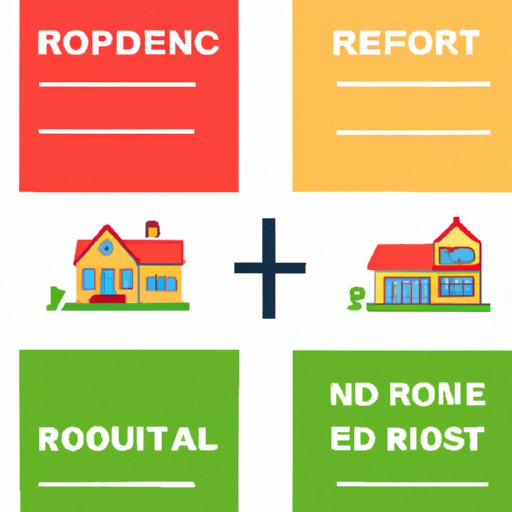Introduction
Buying a home is a major life decision that often comes with both financial and emotional considerations. While there are many factors to consider when deciding whether or not to purchase a house, one of the most important questions to ask yourself is: Is buying a house a good investment? In this article, we will explore the pros and cons of investing in real estate, as well as different types of investment strategies, the financial benefits of homeownership, tax implications, risks associated with investing in real estate, and calculating the return on investment (ROI) of buying a house.
Analyzing the Pros and Cons of Buying a House as an Investment
Before diving into the specifics of investing in real estate, it is important to evaluate the overall pros and cons of making such an investment. The primary advantage of investing in real estate is the potential for appreciation of the property value over time. Additionally, investing in real estate can provide a steady stream of rental income, as well as tax benefits. On the other hand, investing in real estate also comes with several drawbacks, including market fluctuations, vacancy risk, and high maintenance costs.

Exploring Different Types of Real Estate Investment Strategies
When it comes to investing in real estate, there are three primary strategies that investors can choose from: the fix-and-flip strategy, the buy-and-hold strategy, and the Airbnb strategy. With the fix-and-flip strategy, investors purchase a property with the intention of renovating it and then reselling it at a higher price. The buy-and-hold strategy involves purchasing a property with the intention of renting it out to tenants. Lastly, the Airbnb strategy involves renting out a property on a short-term basis via an online platform, such as Airbnb. Each of these strategies has its own set of advantages and disadvantages, so it is important to carefully research each option before making a decision.

Examining the Financial Benefits of Home Ownership
In addition to the potential for appreciation of the property value, investing in real estate can provide several financial benefits, including cash flow from rental income, tax benefits, and appreciation of property value. Rental income is the money paid by tenants for the use of the property, and is typically used to cover expenses such as mortgage payments and property taxes. Tax benefits can include deductions for mortgage interest, property taxes, and capital improvements. Lastly, property values can appreciate over time due to factors such as inflation, market forces, and local economic conditions.

Assessing the Tax Implications of Buying a Home
It is important to understand the potential tax implications of investing in real estate. When selling a property, the profits may be subject to capital gains tax. Additionally, property taxes must be paid annually on any real estate owned. It is important to consult a tax professional to determine which taxes may apply to your particular situation.

Investigating Risks Associated with Investing in Real Estate
Investing in real estate comes with various risks that must be taken into consideration. Market fluctuations can cause property values to fluctuate, which can lead to losses if the property is sold during a down market. Additionally, vacancies can lead to a loss of rental income. Finally, maintenance costs can quickly add up, so it is important to have sufficient reserves to cover unexpected repairs.
Comparing Buying vs. Renting a Home
Another factor to consider when deciding whether or not to invest in real estate is the cost of homeownership. Owning a home comes with costs such as mortgage payments, insurance, property taxes, and maintenance costs. Renting a home, on the other hand, typically only requires paying rent and utilities. Additionally, there are pros and cons to both owning and renting a home, so it is important to weigh all of the factors before making a decision.
Evaluating the Return on Investment of Purchasing a Home
When evaluating the return on investment (ROI) of investing in real estate, it is important to calculate the net profit from the sale of the property. This calculation should take into account all of the costs associated with buying and selling the property, such as closing costs, taxes, and commissions. Additionally, other factors such as the current market conditions and future trends should be taken into consideration when evaluating ROI.
Conclusion
Buying a house is a major life decision that requires careful consideration. While there are many factors to consider, it is important to evaluate the potential pros and cons of investing in real estate, as well as different types of investment strategies, the financial benefits of homeownership, the tax implications, and the risks associated with investing in real estate. Additionally, it is important to calculate the return on investment of purchasing a home before making a decision. Ultimately, the decision to purchase a house should be based on your individual circumstances and goals.
(Note: Is this article not meeting your expectations? Do you have knowledge or insights to share? Unlock new opportunities and expand your reach by joining our authors team. Click Registration to join us and share your expertise with our readers.)
